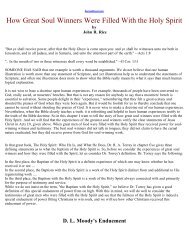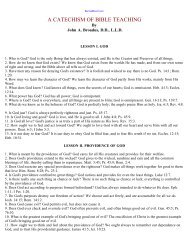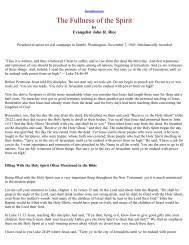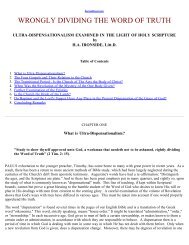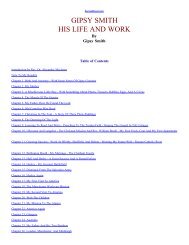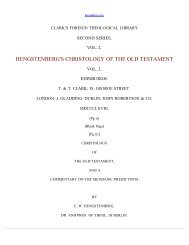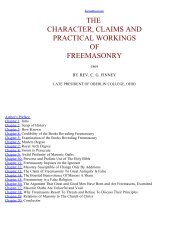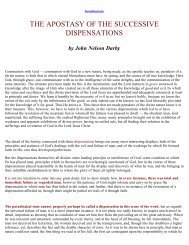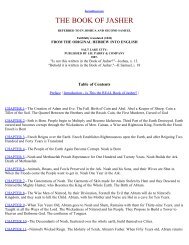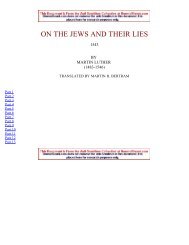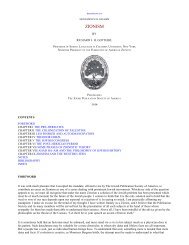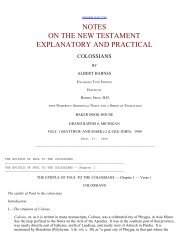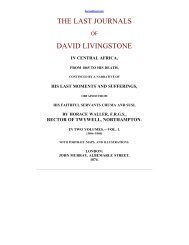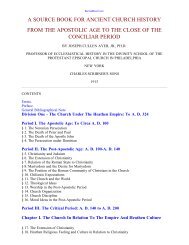Legends of Babylon and Egypt in Relation to Hebrew Tradition.pdf
Legends of Babylon and Egypt in Relation to Hebrew Tradition.pdf
Legends of Babylon and Egypt in Relation to Hebrew Tradition.pdf
Create successful ePaper yourself
Turn your PDF publications into a flip-book with our unique Google optimized e-Paper software.
[4] Cf. Tabl. VII, ll. 116 ff.<br />
[5] The number fifty was suggested by an ideogram employed for Enlil's name.<br />
For what then were the Semitic <strong>Babylon</strong>ians themselves responsible? It seems <strong>to</strong> me that, <strong>in</strong> the "Seven Tablets", we<br />
may credit them with considerable <strong>in</strong>genuity <strong>in</strong> the comb<strong>in</strong>ation <strong>of</strong> exist<strong>in</strong>g myths, but not with their <strong>in</strong>vention. The<br />
whole poem <strong>in</strong> its present form is a glorification <strong>of</strong> Marduk, the god <strong>of</strong> <strong>Babylon</strong>, who is <strong>to</strong> be given pre-em<strong>in</strong>ent rank<br />
among the gods <strong>to</strong> correspond with the political position recently atta<strong>in</strong>ed by his city. It would have been quite out <strong>of</strong><br />
keep<strong>in</strong>g with the national thought <strong>to</strong> make a break <strong>in</strong> the tradition, <strong>and</strong> such a course would not have served the<br />
purpose <strong>of</strong> the <strong>Babylon</strong>ian priesthood, which was <strong>to</strong> obta<strong>in</strong> recognition <strong>of</strong> their claims by the older cult-centres <strong>in</strong> the<br />
country. Hence they chose <strong>and</strong> comb<strong>in</strong>ed the more important exist<strong>in</strong>g myths, only mak<strong>in</strong>g such alterations as would fit<br />
them <strong>to</strong> their new hero. <strong>Babylon</strong> herself had won her position by her own exertions; <strong>and</strong> it would be a natural idea <strong>to</strong><br />
give Marduk his opportunity <strong>of</strong> becom<strong>in</strong>g Crea<strong>to</strong>r <strong>of</strong> the world as the result <strong>of</strong> successful conflict. A comb<strong>in</strong>ation <strong>of</strong><br />
the Dragon myth with the myth <strong>of</strong> Creation would have admirably served their purpose; <strong>and</strong> this is what we f<strong>in</strong>d <strong>in</strong> the<br />
Semitic poem. But even that comb<strong>in</strong>ation may not have been their own <strong>in</strong>vention; for, though, as we shall see, the idea<br />
<strong>of</strong> conflict had no part <strong>in</strong> the earlier forms <strong>of</strong> the Sumerian Creation myth, its comb<strong>in</strong>ation with the Dragon /motif/<br />
may have characterized the local Sumerian Version <strong>of</strong> Nippur. How mechanical was the <strong>Babylon</strong>ian redac<strong>to</strong>rs' method<br />
<strong>of</strong> glorify<strong>in</strong>g Marduk is seen <strong>in</strong> their use <strong>of</strong> the description <strong>of</strong> Tiamat <strong>and</strong> her monster brood, whom Marduk is made <strong>to</strong><br />
conquer. To impress the hearers <strong>of</strong> the poem with his prowess, this is repeated at length no less than four times, one<br />
god carry<strong>in</strong>g the news <strong>of</strong> her revolt <strong>to</strong> another.<br />
Direct pro<strong>of</strong> <strong>of</strong> the manner <strong>in</strong> which the later redac<strong>to</strong>rs have been obliged <strong>to</strong> modify the orig<strong>in</strong>al Sumerian Creation<br />
myth, <strong>in</strong> consequence <strong>of</strong> their <strong>in</strong>corporation <strong>of</strong> other elements, may be seen <strong>in</strong> the Sixth Tablet <strong>of</strong> the poem, where<br />
Marduk states the reason for man's creation. In the second lecture we noted how the very words <strong>of</strong> the pr<strong>in</strong>cipal<br />
Sumerian Crea<strong>to</strong>r were put <strong>in</strong><strong>to</strong> Marduk's mouth; but the rest <strong>of</strong> the Semitic god's speech f<strong>in</strong>ds no equivalent <strong>in</strong> the<br />
Sumerian Version <strong>and</strong> was evidently <strong>in</strong>serted <strong>in</strong> order <strong>to</strong> reconcile the narrative with its later <strong>in</strong>gredients. This will best<br />
be seen by pr<strong>in</strong>t<strong>in</strong>g the two passages <strong>in</strong> parallel columns:[1]<br />
[1] The extract from the Sumerian Version, which occurs <strong>in</strong> the lower part <strong>of</strong> the First Column, is here compared with<br />
the Semitic- <strong>Babylon</strong>ian Creation Series, Tablet VI, ll. 6-10 (see /Seven Tablets/, Vol. I, pp. 86 ff.). The comparison is<br />
justified whether we regard the Sumerian speech as a direct prelim<strong>in</strong>ary <strong>to</strong> man's creation, or as a reassertion <strong>of</strong> his<br />
duty after his rescue from destruction by the Flood.<br />
SUMERIAN VERSION SEMITIC VERSION<br />
"The people will I cause <strong>to</strong> . . . "I will make man, that man may <strong>in</strong> their settlements, [. . .]. Cities . . . shall (man) build,<br />
I will create man who shall <strong>in</strong> their protection will I cause <strong>in</strong>habit [. . .], him <strong>to</strong> rest, That he may lay the brick <strong>of</strong> our<br />
That the service <strong>of</strong> the gods may house <strong>in</strong> a clean spot, be established, <strong>and</strong> that [their] shr<strong>in</strong>es [may be built]. That <strong>in</strong> a<br />
clean spot he may But I will alter the ways <strong>of</strong> the establish our . . . !" gods, <strong>and</strong> I will change [their paths]; Together<br />
shall they be oppressed, <strong>and</strong> un<strong>to</strong> evil shall [they . . .]!"<br />
The weld<strong>in</strong>g <strong>of</strong> <strong>in</strong>congruous elements is very apparent <strong>in</strong> the Semitic Version. For the statement that man will be<br />
created <strong>in</strong> order that the gods may have worshippers is at once followed by the announcement that the gods themselves<br />
must be punished <strong>and</strong> their "ways" changed. In the Sumerian Version the gods are united <strong>and</strong> all are naturally regarded<br />
as worthy <strong>of</strong> man's worship. The Sumerian Crea<strong>to</strong>r makes no dist<strong>in</strong>ctions; he refers <strong>to</strong> "our houses", or temples, that<br />
shall be established. But <strong>in</strong> the later version div<strong>in</strong>e conflict has been <strong>in</strong>troduced, <strong>and</strong> the future head <strong>of</strong> the pantheon<br />
has conquered <strong>and</strong> humiliated the revolt<strong>in</strong>g deities. Their "ways" must therefore be altered before they are fit <strong>to</strong> receive<br />
the worship which was accorded them by right <strong>in</strong> the simpler Sumerian tradition. In spite <strong>of</strong> the epi<strong>to</strong>mized character<br />
<strong>of</strong> the Sumerian Version, a comparison <strong>of</strong> these passages suggests very forcibly that the Semitic-<strong>Babylon</strong>ian myth <strong>of</strong><br />
Creation is based upon a simpler Sumerian s<strong>to</strong>ry, which has been elaborated <strong>to</strong> reconcile it with the Dragon myth.<br />
The Semitic poem itself also supplies evidence <strong>of</strong> the <strong>in</strong>dependent existence <strong>of</strong> the Dragon myth apart from the process<br />
<strong>of</strong> Creation, for the s<strong>to</strong>ry <strong>of</strong> Ea <strong>and</strong> Apsû, which it <strong>in</strong>corporates, is merely the local Dragon myth <strong>of</strong> Eridu. Its <strong>in</strong>clusion<br />
<strong>in</strong> the s<strong>to</strong>ry is aga<strong>in</strong> simply a tribute <strong>to</strong> Marduk; for though Ea, now become Marduk's father, could conquer Apsû, he



